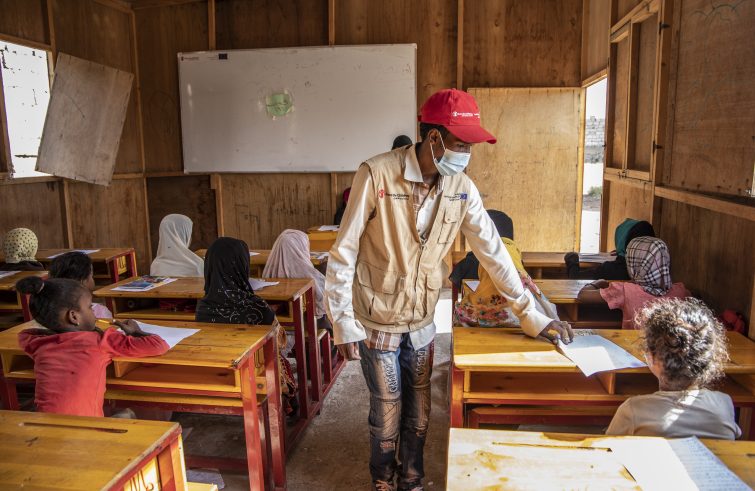
Yemen’s children “urgently need medicine, food and education. The war left a trail of violence and disabilities, with serious mental consequences, interaction deficit and a sense of sadness and depression”, said Chiara Moroni, 33, a humanitarian aid worker for Save the Children from Bergamo, Italy, contacted by SIR in Sana’a, capital of Yemen, where she is based. She previously worked in “conflict zones” such as Iraq, Afghanistan and Palestine. Over five years of war have devastated the Country, leaving over 100,000 dead, including more than 12,000 civilians.
At the forefront of child protection. “I must dispel the myth that we are some sort of missionaries, more courageous than others,” Chiara pointed out. “Nowadays, I think it takes more courage to work in a coronavirus hospital ward in Bergamo. Although living in conflict zones is not simple, I think it’s important to be passionate about our work. Protecting minors is the driving force behind my work in these countries.” Chiara works in the area of education for Save the Children, providing support with a team of some 40 aid workers (Yemeni and Italian expats) throughout the country. They reach out and offer educational support to some 100 schools. After spending the first months of her assignment in Aden, Chiara moved to the thousand-year-old fascinating capital Sana’a, with its historic mud brick towers. Here no bombs are falling, and there are no ongoing clashes between the two factions – the Houthi rebels and the Saudi-led government coalition – but the impact of the conflict is felt nonetheless.
Caught between conflict and pandemic. Power outage and warm water shortage are daily inconveniences, yet this is nothing compared to the extreme poverty of 80% of Yemenis, caused by economic crisis, escalating inflation rate and now also the pandemic. Reported cases of infection are not high due to low levels of testing. Since most of the population lives in rural areas, prevention awareness-raising campaigns are broadcast via radio, megaphones on cars and with songs for children. Even the loudspeakers atop mosques send warnings about the virus: all Muslim leaders have been involved.
 The humanitarian crisis. The situation is more severe in other parts of the country, notably near combat zones, amidst airstrikes and unrelenting violence. Poverty and famine, diseases
The humanitarian crisis. The situation is more severe in other parts of the country, notably near combat zones, amidst airstrikes and unrelenting violence. Poverty and famine, diseases
(including cholera, dengue, malaria, chikungunya), collapsing healthcare facilities, 2000 schools hit by bombings, 250 of which destroyed and 1500 damaged, locust invasion and flash floods. The UN described the situation in Yemen as
“The worst humanitarian crisis in the world” with over 24 million people, half of them children, in need of some form of humanitarian assistance and protection.
Despite this severe crisis situation, only 44% of the UN 2020 Yemen Humanitarian Response Plan (YHRP) has been funded, with virtually no press coverage.
The Pope’s appeal. Pope Francis addressed this issue at the Angelus prayer of January 1st, calling for “solutions that allow peace to return to that tormented population” and for “the children in Yemen. Without education, without medicine, hungry.” “The Pope’s concern for the country came as a pleasant surprise,” she said:
“The conflict has since become low-intensity, but the violence is unrelenting against the backdrop of a complex crisis with many interests at stake.
The challenge of education. In addition to emergency and life-saving relief operations – food and healthcare above all – carried out by the many NGOs working in Yemen, education remains a priority “because we are investing in the future of the country.” Chiara recalled the experience of visiting camps for displaced people and witnessing the joy of children as they receive school material (exercise books, pencils, pens, backpacks), as well as the resilience of the teachers and parents offering their support in the learning process, to help with homework, or to ensure distancing and organising classes of up to 80 children in shifts.
 Hope and resilience. Schools were closed for several months during the lockdown, but classes resumed in October. Many children now wish to study or attend vocational training programs: “this shows that the country wants to move forward”, despite the fact that 2 million children had already dropped out of school before the COVID-19 pandemic. “The commitment and involvement of communities is heartwarming”, she said – “or seeing how happy headmasters and teachers are when we help them restore electricity, water and sanitation infrastructure in schools, and return to the classroom with masks and protective measures in place. It makes a huge difference to them.”
Hope and resilience. Schools were closed for several months during the lockdown, but classes resumed in October. Many children now wish to study or attend vocational training programs: “this shows that the country wants to move forward”, despite the fact that 2 million children had already dropped out of school before the COVID-19 pandemic. “The commitment and involvement of communities is heartwarming”, she said – “or seeing how happy headmasters and teachers are when we help them restore electricity, water and sanitation infrastructure in schools, and return to the classroom with masks and protective measures in place. It makes a huge difference to them.”
Serious nutritional problems: some 325,000 children under the age of five suffer from severe acute malnutrition. In some of the health facilities served by Save the Children, in both the north and south of the country, the number of malnourished children seeking life-saving treatment increased by 60% between the end of 2019 and July 2020. One clear sign of the deteriorating nutritional situation is that people can no longer afford to buy food due to soaring prices. The number of people facing such dramatic food insecurity could increase by up to threefold, from 16,500 people today to 47,000 people between January and June 2021, according to UN agencies. Such a complex and critical situation can only be overcome with the end of the conflict and the establishment of peace. Hence Save the Children’s appeal for
“a ceasefire” as soon as possible.









